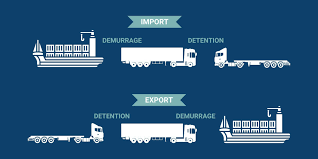The terms demurrage is used greatly in the logistics world. Essentially they are considered fees that are levied for when cargo is held at a terminal or container warehouse for a lengthy period of time. Let us explain.
What does demurrage mean?
Once a shipment arrives at its port (be it rail, air or sea), there are procedures set in place that allows for the shipment to stay in the period that is considered free. The length of this time is denoted by the terminal in question and should never be assumed. Whilst the standard free period is 4-7 days of free storage for the shipment, you need to make sure with the parties involved to avoid fees like demurrage and detention being levied in your final bill. If you are confused as to why they appear on your bill in the first place, its usually because of the different practices based on the port itself, thus if you are unsure when you are liable to pay demurrage and/or detention fees, then its best you are made aware of it before embarking on shipping your cargo.
How are you charged?
How you end up getting charged for demurrage could be due to a number of reasons. You may have filled out your shipping documents incorrectly or they may be incomplete and thus held up at the destination port with paperwork delays. Whilst your containers full of cargo is stuck in in limbo in terms of unloading until the paperwork issues get resolved you are also incurring demurrage fees. Another scenario may be that you have sent your cargo to the terminal to load onto a shipping vessel but due to natural disaster delays, the vessel will not be in port for a number of days, and if you go beyond the free period denote by that terminal, your cargo for exports will also incur demurrage fees.
How would you know?
The fact of the matter is, you may not know when you have to start paying demurrage fees. The first step is to find out. Furthermore you can also try to find out how much you will have to pay per day. As a carrier and terminal may have its own protocols and rates, its always a good rule of thumb to be in the know in each scenario, as you may either be charged per day or per container. At certain ports, if you have exceeded a week in a terminal daily charges may also increase thereafter.
Why are you charged?
Whilst putting blame isn’t always best, demurrage is a very frustrating factor in the logistics world. In the event you have undertaken all likely precautions, there may be delays with shipping vessels and civil unrest that be at the root of it. However, demurrage isn’t present to blindly increase your final bill but as in incentive to clear your cargo as soon as possible. All terminal has their capacities in terms of available resources and facilities and thus the turnover of storage is an important factor to any economy. Thus the need to ensure a smooth running process is in need and it is our duty as individuals of the logistics industry to ensure that we respect this well-oiled machine. Thus by speaking to Transco Cargo, who are experienced freight forwarders, you will be able to make attempts towards ensuring you are not burdened by demurrage fees.

